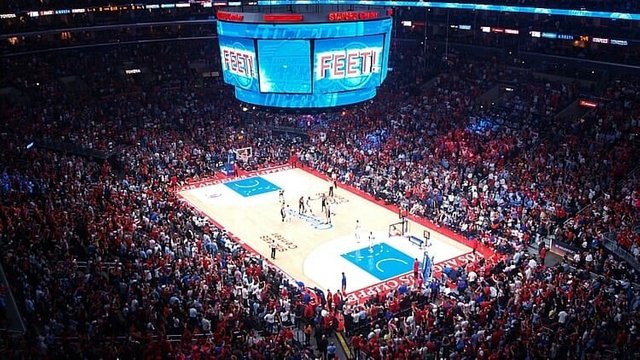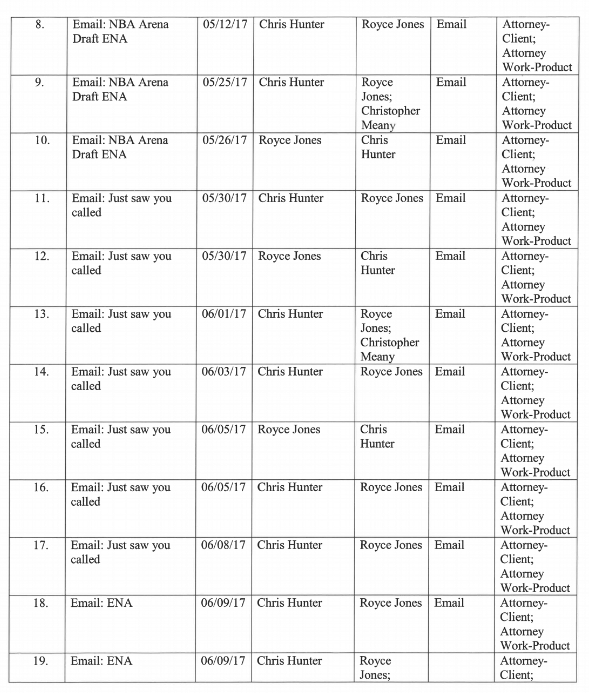Inglewood Ordered to Release 100+ "Privileged" Emails Relating to Clippers Arena Proposal
Communications could elucidate the nature of planning discussions
In a ruling last week, the Los Angeles County Superior Court ordered the City of Inglewood must make public previously withheld emails regarding plans to build a basketball arena in the city.
I previously reported how Inglewood attorneys liberally applied legal privileges to conceal over 100 emails ostensibly pertaining to a June 15th 2017 Exclusive Negotiating Agreement (ENA) between the City and representatives for the Los Angeles Clippers. The messages date back several months before the ENA was ratified.
Lawyers for Inglewood Residents Against Takings and Evictions (IRATE) – who filed suit against the City in July 2017 – are seeking all communications between the City and the arena’s potential developers dating back to Sept 2016, hoping to shed light on their lawsuit’s key claims.
Last December, the Inglewood city attorneys produced a limp collection of fewer than 20 emails and several news articles, affirming under threat of perjury these items represent the extent of all communications related to drafting a 3-year, $1.5 million contract between the City and Clippers representatives. The attorneys also included a list of metadata (subject, date, sender, recipients) for 133 further emails – but they claimed the emails should be kept secret due to attorney-client privilege and attorney work-product privilege.
IRATE lawyers responded by motioning for an “augmented record,” disputing the City’s grounds for censoring the 133 emails and further asserting even more written communication must exist on the matter beyond what the City had produced, such as text messages or emails amongst city officials.
On Friday Mar 2, Judge Amy Hogue partially agreed, ruling attorney-client privilege and attorney work-product privilege do not apply to the secret 133 emails, based on a 2013 CEQA decision I described in January. But she did not agree there is more communication to be uncovered, writing the “Petitioner’s complaints amount to suspicion and conjecture.”
Doug Carstens, the lawyer who represents IRATE in this case, said his side is “disappointed” with the judge’s ruling.
“CEQA’s fundamental purpose […] is not just environmental protection,” he said in a phone interview. “It’s also government transparency.”
According to Mr. Carstens, an environmental lawyer with numerous victories in CEQA lawsuits, the law requires public agencies to solicit public participation throughout the process of planning a development. He believes many of the arena details have been decided upon in emails and meetings that will never see the light of day.
“I continue to think that out there somewhere are bunches of e-mails and text messages and other stuff that we haven’t gotten,” he said.
The litigating attorney representing the City, Bruce Gridley of the Kane, Ballmer & Berkman law firm, gave a short statement on Judge Hogue’s ruling but did not wish to provide commentary on any other matters related to the suit.
“The City intends to comply with the court order,” he said in a phone interview.
“What Inglewood has done here and what it is doing – they’re striking fundamentally at a pillar of state law.” – Doug Carstens, lawyer representing Inglewood Residents Against Takings and Evictions (IRATE)
Despite the setback for Mr. Carstens, he still believes IRATE has a robust claim against the city based on what’s already public.
CEQA stipulates a developer and cooperating public agencies must consider several alternatives to a development proposal and gather public commentary to help decide objectively between those alternatives. Governments and developers must even consider having no project at all.
IRATE’s lawsuit argues city officials cannot impartially choose between the options they’re required to generate, since part of the approved ENA text includes a provision stating the City “shall not negotiate with or consider any offers or solicitations from any person or entity other than the developer” when it comes to the “development of the [proposed] site.”
“In other words, they’ve already decided they want an arena and they want it there and they want it in the shape that the Clippers want it. Everything else they do is window dressing to defend that decision,” said Carstens. “That is a violation of the law of the state of California, and that’s why we filed the lawsuit.”
In late February, the City of Inglewood announced the beginning of the environmental review process required by CEQA. The endpoint of this process is an environmental impact report (EIR), which should contain analysis of project alternatives.
Mr. Carstens called that alternatives section the “heart of the EIR.”
“It is a picture of the choices that the [public] agency is making, the cost essentially that it’s having to incur and the thing that it’s giving up by choosing the project,” he said, adding, “What Inglewood has done here and what it is doing – they’re striking fundamentally at a pillar of state law.”
The review process is expected to take about 18 months to complete. Mr. Carstens and Mr. Gridley are due to return to the court in May.
This article was originally published on warrensz.me on March 7, 2018.

